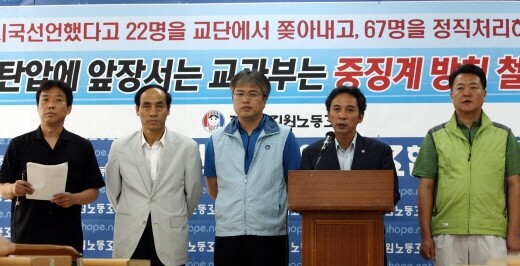hankyoreh
Links to other country sites 다른 나라 사이트 링크
National government moving to withdraw recognition of teachers’ union

By Kim So-youn and Kim Ji-hoon, staff reporter
As the South Korean government moves to withdraw its legal recognition of the Korea Teachers and Education Workers’ Union (KTU) because the union’s constitution views dismissed instructors as union members, critics are claiming that this runs contrary to international standards. The International Labour Organization (ILO), whose members include the labor, management, and governments of 183 countries, has already on several occasions called for the abolition of the provision in Korea’s labor law that states that disqualifies dismissed workers from union membership.
To summarize the comments made by scholars and labor activists on Feb. 25, workers who have not directly agreed to an employment contract with an employer, including those who have been fired, who are out of a job and who are looking for work, are recognized as being eligible to become union members in most developed countries, and this also goes for teachers.
According to a report titled “A Study of Reasonable Ways to Improve Labor Relations Between Teachers and Employers,” published by the Korea Society of Labor Law in 2010, major developed countries such as France, Germany, and the United Kingdom grant union membership to teachers that have been terminated. France has even recognized unemployed teachers as union members since 1920, and Germany’s largest teacher’s union (the Education and Academic Labor Union) and the UK‘s teacher’s union both include retired instructors, unemployed teachers, and university students among their ranks.
Perhaps reflecting these international standards, the ILO’s Committee on Freedom of Association recommended in Mar. 2012 that the South Korean government abolish “Clause 4 of Article 2 of the Trade Union and Labor Relations Adjustment Act, which denies terminated workers and unemployed workers the right to join a union.”
This recommendation was made following a lawsuit brought to the ILO against the South Korean government by the Korean Confederation of Trade Unions (KCTU). This lawsuit was a response to a 2009 decision by the Ministry of Employment and Labor that the 140,000 member-strong Korean Government Employees’ Union (KGEU) was an unrecognized union, arguing that terminated employees were not eligible to be union members.
Clause 4 of Article 2 of the Labor Law says that “an organization shall not be regarded as a trade union...where those who are not workers are allowed to join it,” which includes dismissed workers. In the past, the ILO has expressed its opinion that “eligibility for union membership is something for the union to decide through its bylaws, and the government authorities may not infringe this right of labor unions” (2002) and that “preventing a union member from continuing to be active in the union because that member has been dismissed involves the risk of anti-union discriminatory behavior” (1997).
As a result of the Korean government disregarding the recommendations made by the international organization, South Korea has failed to ratify four of the eight key agreements passed by the ILO, including 87 and 98, which provide for freedom of association. South Korea is one of only seven countries of the total 183 ILO member states that have not ratified any of these four key agreements. The others are China, Brunei, Fiji, the Maldives, the Marshall Islands, and Tuvalu.
In its report, the ILO said, “The right to organize is the foremost of workers’ rights, and it is a essential prerequisite without which the other rights guaranteed in agreements 87 and 98 will be drained of their force.”
“We are already among the most backward member states in terms of basic labor rights,” said Jung Ho-hee, spokesperson for the KCTU. “If we deny [workers] the right to organize and force the KTU to become an unrecognized union, the new administration will become a global laughingstock at its outset.”
Please direct questions or comments to [english@hani.co.kr]

Editorial・opinion
![[Column] Park Geun-hye déjà vu in Yoon Suk-yeol [Column] Park Geun-hye déjà vu in Yoon Suk-yeol](https://flexible.img.hani.co.kr/flexible/normal/500/300/imgdb/original/2024/0424/651713945113788.jpg) [Column] Park Geun-hye déjà vu in Yoon Suk-yeol
[Column] Park Geun-hye déjà vu in Yoon Suk-yeol![[Editorial] New weight of N. Korea’s nuclear threats makes dialogue all the more urgent [Editorial] New weight of N. Korea’s nuclear threats makes dialogue all the more urgent](https://flexible.img.hani.co.kr/flexible/normal/500/300/imgdb/original/2024/0424/7317139454662664.jpg) [Editorial] New weight of N. Korea’s nuclear threats makes dialogue all the more urgent
[Editorial] New weight of N. Korea’s nuclear threats makes dialogue all the more urgent- [Guest essay] The real reason Korea’s new right wants to dub Rhee a founding father
- [Column] ‘Choson’: Is it time we start referring to N. Korea in its own terms?
- [Editorial] Japan’s rewriting of history with Korea has gone too far
- [Column] The president’s questionable capacity for dialogue
- [Column] Are chaebol firms just pizza pies for families to divvy up as they please?
- [Column] Has Korea, too, crossed the Rubicon on China?
- [Correspondent’s column] In Japan’s alliance with US, echoes of its past alliances with UK
- [Editorial] Does Yoon think the Korean public is wrong?
Most viewed articles
- 1‘We must say no’: Seoul defense chief on Korean, USFK involvement in hypothetical Taiwan crisis
- 2Will NewJeans end up collateral damage in internal feud at K-pop juggernaut Hybe?
- 3[Column] Park Geun-hye déjà vu in Yoon Suk-yeol
- 4Why Korea shouldn’t welcome Japan’s newly beefed up defense cooperation with US
- 5Thursday to mark start of resignations by senior doctors amid standoff with government
- 6N. Korean hackers breached 10 defense contractors in South for months, police say
- 7[Guest essay] The real reason Korea’s new right wants to dub Rhee a founding father
- 8[Column] ‘Choson’: Is it time we start referring to N. Korea in its own terms?
- 9Kim Jong-un expressed ‘satisfaction’ with nuclear counterstrike drill directed at South
- 10[Editorial] New weight of N. Korea’s nuclear threats makes dialogue all the more urgent